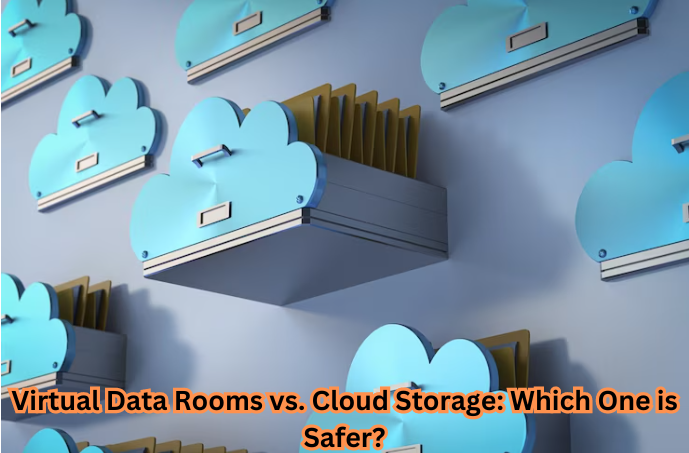Virtual data room vs cloud storage safety: Businesses and people alike must choose which platform to protect their sensitive information in this data-driven digital age. Two common options with benefits and security features are cloud storage and virtual data rooms. This article will help you make an educated selection based on your unique requirements by diving into the intricacies of virtual data rooms and cloud storage and analyzing their security characteristics.
Getting the Hang of Things: Cloud Storage and Virtual Data Rooms
Data Rooms in the Cloud (VDR)
When conducting business, particularly during mergers, acquisitions, or financial transactions, it is important to have a safe place to store and communicate sensitive information. Virtual data rooms provide just that. They offer a secure, regulated environment to ensure that no one other than authorized users may access the data.
Remote Data Storage
Cloud computing, in contrast, is an umbrella word for various services that facilitate data storage and access via the Internet. Its backup, sharing, and collaboration features are highly sought after. Thanks to cloud storage services, data may be easily retrieved from any device with an internet connection,

Priority on Safety: A Rational Evaluation
Using Virtual Data Rooms to Keep Fort Knox Safe
Data is protected while in motion and stored in a virtual data room using state-of-the-art encryption protocols. Even if unwanted parties gain access, interpreting the data would be impossible thanks to advanced encryption methods such as 256-bit AES encryption. The encryption level of VDRs is comparable to that of financial institutions, demonstrating how seriously they protect sensitive data.
Cloud Storage: Various Standards for Encryption
The standards may differ, but encryption is a common feature of many cloud storage providers. While some service providers use strong encryption, others may use less secure alternatives. Furthermore, not all cloud storage providers automatically encrypt data at rest, so your information might be at risk if the service doesn’t take enough security steps.
Controls for Access: Who Has Control?
Controlling Access to Virtual Data Rooms on a Granular Level
The ability to grant users very specific permissions is a notable feature of virtual data rooms. Administrators have the power to set precise permissions for every user, ensuring that they may access only the required data and features. This degree of access control is achieved by ensuring that private information remains in the appropriate hands and minimizing the danger of data breaches.
Cloud Storage: Controlling Access Levels
Though they may lack the sophistication of virtual data rooms, access restrictions are often available with cloud storage providers. The level of detail compared to VDRs may be lacking when setting rights for individual files and folders. Particularly when selective data sharing is required, this might result in accidental access.
Meeting Industry Standards: Ensuring Compliance and Earning Certifications
Compliance: The Bedrock of Virtual Data Rooms
Virtual data rooms frequently include compliance certifications like SOC 2 and ISO 27001, useful for sectors with strict legal requirements. Users may rest easy knowing their data is well protected because the VDR provider has earned these prestigious certifications. This is especially important when dealing with sensitive commercial transactions.
Cloud Storage: Different Degrees of Compliance
When it comes to certifications for compliance, cloud storage providers differ. Some place a premium on security and seek certifications to prove it to consumers, while others could be lax. Lack of specialized qualifications may be risky for firms with highly regulated data.
Enhancements for Collaboration: Finding the Right Balance Between Safety and Efficiency
Secure Collaboration Hub: Virtual Data Rooms
Secure cooperation throughout complex corporate procedures is made possible with virtual data rooms. Document versioning, activity tracking, and user comments are capabilities they offer inside the platform. These solutions were built with security in mind to ensure that teamwork doesn’t jeopardize data integrity.

Collaboration in the Cloud: Exercise Caution
While cloud storage is great for teamwork, it may compromise security in the name of efficiency. There are tools for teamwork, but they may not be as well integrated with safety features as VDRs. Companies should consider the advantages of working together with any security concerns.
Determination: A Choice Tailored to Your Specific Requirements
The age-old question of whether to use cloud storage or virtual data rooms has no definitive answer. Your data’s kind, business sector, and security needs will determine your best option. If you’re handling sensitive transactions or private company procedures, the improved security features of virtual data rooms make them an appealing solution. Cloud storage, on the other hand, might be more suited to your requirements if you value accessibility and cooperation more than the strictest security protocols.
Finding Your Way Through the Security Landscape: A Conclusion
Your data’s security in cloud storage and virtual data rooms depends on their intricate security measures. With strong encryption, accurate access restrictions, and certifications for compliance, virtual data rooms have emerged as strongholds of data protection. While cloud storage can provide many benefits, including collaboration and ease of use, you should check that its security measures meet your needs before using it.
Finding the sweet spot between safety and usefulness ultimately determines whether virtual data rooms or cloud storage is better. Knowing the ins and outs of virtual data rooms and cloud storage can help you protect your data in the dynamic digital world, whether you choose the vault-like protection of a virtual data room or the collaborative ease of cloud storage.
FAQ: Virtual data room vs cloud storage safety
The utmost worry for companies as they go through the digital world is critical data security. Virtual data rooms (VDRs) and cloud storage are two popular choices when deciding on a data storage and management platform. This article is structured like a frequently asked question (FAQ) and aims to answer typical questions about the security of cloud storage and virtual data rooms. If you’re confused about the security features of these virtual havens, this article will help you understand the complexities and make a well-informed selection based on your needs.
How secure are virtual data rooms?
The answer is that safety is paramount when designing virtual data rooms (VDRs). Data is protected during transit and at rest using strong encryption algorithms like 256-bit AES encryption. Virtual data repositories (VDRs) provide a haven for sensitive data during mission-critical business operations because they conform to industry standards, including activity-tracking capabilities, and often have granular access restrictions.
Is cloud storage safe for sensitive data?
The response is that the security of private information stored in the cloud is very provider- and policy-specific. Although encryption is a feature of many cloud storage providers, the standards could differ. Picking a trustworthy service that puts security first, uses robust encryption mechanisms, and, ideally, has relevant certifications is of the utmost importance. To further guarantee the security of sensitive data, users should set up access restrictions correctly.
Is cloud storage safer than local storage?
The answer is that cloud storage has different security concerns compared to local storage. Cloud storage’s off-site backup feature makes protecting data from local calamities easier. The supplier’s security measures determine the safety level for cloud storage. Physically limiting storage to one’s location may make it seem safer, but cloud storage offers several advantages that local storage does not, like redundancy and accessibility. The decision is based on your individual risk tolerance and security requirements.
What is the difference between VDR and cloud storage?
However, there are distinct functions for cloud storage and virtual data rooms (VDRs). Secure cooperation during essential corporate procedures, including mergers and acquisitions, is made possible via specialized platforms called VDRs. They provide cutting-edge security options, including encryption, compliance certifications, and granular access restrictions. A more comprehensive option for online file storage and retrieval is cloud storage. Collaboration features are nice, but security measures aren’t always consistent and may not be enough for confidential transactions.
Are virtual machines 100% safe?
Answer: It would be absurd to guarantee complete safety when using virtual machines (VMs) to execute applications and services. However, VMs do provide a secure environment. Virtual machines (VMs) offer security risks and vulnerabilities like any other technology. Security best practices, frequent upgrades, and threat monitoring are all part of keeping virtual computers safe. The regulations and underlying infrastructure also impact the security of virtual machines. Protecting virtual computers requires constant vigilance from administrators and strict adherence to established security procedures.
virtual data room vs cloud storage safety

